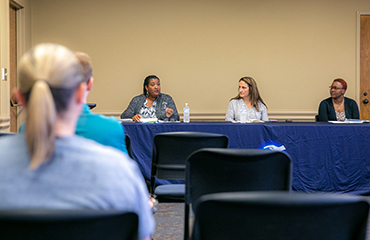
“As a nurse, I believe there is no way to heal without hope. The two go hand in hand.”
So said Lander University School of Nursing Dean Dr. Holisa Wharton, a participant in the “Hope and Healing” panel discussion held on Thursday, March 31, in recognition of Women’s History Month.
“When we lose hope, we can sometimes find ourselves in a very, very dark place,” she said.
Wharton cited numerous examples of women such as Clara Barton, founder of the American Red Cross, who have played “a major role” in giving hope to other people and healing wounds of all kinds. She said that women, whether nurses or not, have “always found ourselves in this role.”
Kim Shannon, executive director of Wellness and Holistic Support, also spoke at the event, sponsored by Lander’s Diversity Advisory Council. She said that Wellness Center staff members have seen an increase in mental health issues, like anxiety and depression, as a result of the ongoing pandemic.
It is essential that Wellness Center staff members always be at their best, Shannon said, so that they can help students who may be at their worst.
“For many people who come through our door, this is a courageous decision, to finally come and get help with something that they’ve struggled with. We have to make sure that we are welcoming, that we are not judgmental, that we are helpful, that we’re positive, that we present everything we would want to see if we were going somewhere to seek help. Because people are looking for hope. They’re looking for help and they’re looking for hope.”
Rounding out the panel was Jalysa Green, director of Student Conduct and Community Standards.
Visits to her office aren’t typically ones that students enjoy, Green said, because they are often associated with conduct violations or disciplinary matters. Although those students need to be held accountable for their actions, she said she is “very much an encourager” who tries to help students see their sanctions as “a bump in the road.”
Green said she wants to “uplift” students. She wants them to think that “maybe this is something I can get over.”